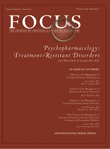From the Guest Editor
FOCUS is truly intended to provide continuing medication education for practitioners that will have an impact on their practice by presenting state-of-the-art, evidence-based medicine. This issue of FOCUS is of particular relevance to psychiatrists because it provides an update on treatment-refractory psychiatric disorders including major depression, anxiety disorders, and schizophrenia. Many patients with psychiatric disorders are treated by nonpsychiatrists including family physicians, general practitioners, and obstetricians/gynecologists. This situation is unavoidable because there are simply too few psychiatrists to treat the large numbers of patients who have these major psychiatric illnesses. Therefore, as psychiatrists, we are referred the substantial numbers of patients with mood and anxiety disorders that do not respond to monotherapy with commonly prescribed psychopharmacological agents such as selective serotonin reuptake inhibitors.
In this issue of FOCUS, we provide overviews of the management of treatment-refractory depression, schizophrenia, and major anxiety disorders. In addition, we provide a look into the future by reviewing the emerging field of personalized medicine in psychiatry, which has the goal of reducing treatment failures in patients with these disorders by matching individual patients with the therapies most likely to successfully treat their symptoms, both psychopharmacologically and psychotherapeutically.
As with all issues of FOCUS, we also have the unique opportunity to publish reprints of several of the seminal publications in the field in their entirety and abstracts of others. This will allow practitioners to have at their disposal in a single issue of the journal a summary of management of patients with treatment-refractory disorders. After reading the entire volume, one inexorable conclusion is reached—psychiatric treatment of these disorders remains far from optimal, and considerably more controlled clinical trials, as well as novel approaches, are needed to further advance the field.



